 With USA baseball 棒球 (bàng qiú) heading into the 2016 MLB postseason 美国职棒大联盟季后赛 (měi guó zhí bàng dà lián méng jì hòu sài), let’s take a look at some of the common baseball phrases we love to use in the United States for everyday life, business, and even in politics.
With USA baseball 棒球 (bàng qiú) heading into the 2016 MLB postseason 美国职棒大联盟季后赛 (měi guó zhí bàng dà lián méng jì hòu sài), let’s take a look at some of the common baseball phrases we love to use in the United States for everyday life, business, and even in politics.
You see, baseball is one of America’s oldest sports and current favorite past-time. Even though some say it’s as boring as all get out, it’s still part of the culture!
And here’s a comprehensive list for basketball…
It’s a long article, so be sure to favorite or share so you can easily come back to it for review… and to not end up like this guy:
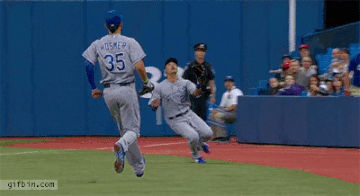 Don’t be like this guy.
Don’t be like this guy.
ballpark
Ballpark, in the ballpark, ballpark figure, and out of the ballpark — “Ballpark” has been used to mean a broad area of approximation or similarity, or a range within which comparison is possible; this usage the Oxford English Dictionary dates to 1960. Another meaning, “sphere of activity or influence”, is cited in 1963. “In the ballpark”, meaning “within reasonable bounds” dates to 1968. A “ballpark figure” or “ballpark estimate,” one that is reasonably accurate, dates to 1967. The meaning of “out of the ball park” is to hit a home run; its non-baseball equivalent is to do something well or exactly as it should be done.
“MSNBC said Hillary knocked it ‘out of the park.'” – New American Media, 27 August 2008.
batting 1000
Also “batting a thousand.” Getting everything in a series of items right. In baseball, someone with a batting average of one thousand (written as 1.000) has had a hit for every ‘at bat’ in the relevant time period (e.g., in a game). Its non-baseball usage goes back to the 1920s. May also be used sarcastically when someone is getting everything wrong.*
“‘But Boston Scientific also needs to hope that a rare event does not become magnified,’ he said. ‘It has to be pretty much batting a thousand for a time,’ he said.” — Reed Abelson, The New York Times, 27 July 2004
big hitter(s)
At the highest level; used as a noun to describe a person.
“What a big hitter, he got three new girls’ Wechats last night!”
big league(s)
At the highest level; used as a noun for a place someone is at in life or as an adjective. OED cites “big league” as specifically American Major League Baseball, and cites its first use in 1899; the non-baseball use appears in 1947. Synonym: major league, majors. Antonym: bush league, minor league.
“Under its music director, Michael Palmer, it sounded for the most part like a big-league band, at home in a big-league setting.” — James Oestreich, The New York Times, 25 January 1994.
closer
In baseball, a closing pitcher brought in to finish the game. In business, the person brought in to close the deal, or to get things done.
“For next week’s marketing pitch, we’re gonna bring in our closer.”
 He’s in the big leagues now.
He’s in the big leagues now.
cover one’s bases
Also cover all the bases. Means to ensure safety. In baseball, a defensive player covers a base by standing close to it, ensuring a runner can not reach it safely. In business, covering one’s bases means being prepared for every contingency.
“We don’t have any reason to believe it was murder, but you just want to be sure you cover all the bases.”
curve, curveball
A surprise, often completely and totally unexpected, and usually unpleasant. The curveball is a pitch in baseball designed to fool the batter by curving unexpectedly.
“Because of my personal story, I’m very interested in illness. One thing we discovered as a family is that when you’re thrown a curveball like cancer or multiple sclerosis, often people do not know what to do first”. – Meredith Vieira, quoted by Jeff Chu, Time, 27 August 2006.
double header
Two contests (or similar events) held on the same day with the same participants.
“The city’s three mayoral candidates finished Wednesday’s political double header with a debate at First Congregational United Church for Christ.” — Andrew Edwards, Contra Costa Times, 21 October 2009.
down to the last out
To have just one last chance, to be near the end of the competition. Also sometimes expressed as “down to the last strike“.
“He/she is now down to his/her last out”.
first base
In baseball, a hitter hopes to reach first base and then continue around second and third bases until he reaches home. In interpersonal relations, an individual who can’t get to first base with another person is unable to achieve some initial goal or to establish a relationship. Getting an appointment with a potential customer might be first base in a business transaction or negotiation.
Also a metaphor for romantic relationships: first base/second base/third base/home run are widely used to describe certain stages of a successful date, though precisely which acts fall under which base appear to be a regional or subcultural idiom. First base is usually a simple goodnight kiss.
“Under the headline, “Getting Past First Base,” a writer asks: “How do you turn an initial contact with a prospect into a fully-fledged business relationship? It’s the essence of sales – but it’s an area where many people really struggle”.” — Ian Brodie, 8 November 2008.
“How was your date last night? It was great, we got to third base!”
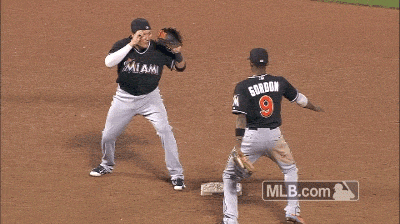 That’s one way to get to second base.
That’s one way to get to second base.
grand slam
Any sudden sweeping victory. A batter who hits a home run with bases loaded has hit a four-run “grand slam”, a term originally borrowed from contract bridge for winning thirteen tricks. Aside from baseball, the term now refers to a situation which may or may not end badly for the protagonist but from which he emerges as an obvious winner. The term also can refer to anything good which comes in four parts, such as a “grand slam breakfast.”
Headline: “Boeing Hits Grand Slam with Four DoD Deals” – John Adams, GovconWire, 7 September 2010.
grandstanding
In baseball, a player who shows off or showboats to win the favor of the fans (in the grandstand) is said to be grandstanding. In other contexts, including politics, playing to the crowd, the audience, or the media might be described as grandstanding.
“Tellem weighed in with a thoughtful back-page article in this Sunday’s New York Times regarding the recent Congressional and mainstream media grandstanding over steroids”. — Jay Jaffe, Futility Infielder, 5 April 2005.
hardball, play hardball
To be or act tough and aggressive. As a synonym for baseball, OED dates this use of “hardball” to 1883; its non-baseball use appears in 1973. Antonym: softball, play softball.
“Hauser would like to extend its three-year contract with Bristol-Myers, becoming a supplier of the material for semi-synthetic Taxol. ‘I think this is just tough bargaining,’ said Deborah Wardwell of Dain Bosworth Securities. ‘It seems to suggest hardball tactics.'” — Milt Freudenheim, The New York Times, 10 January 2007.
heavy hitter
A powerful or commanding person, a leader. In baseball a heavy hitter is a slugger, someone who hits a lot of extra base hits or home runs. In business, the heavy hitters may be those who draw the most clients or make the most sales, or who lead the organization. In politics a heavy hitter draws crowds or has a lot of power or influence.
Headline: “Boeing uses him as its heavy hitter. As it’s done with other troubled programs, the company is relying on Patrick Shanahan to get the 787 back on track” — Los Angeles Times, 24 February 2008.
hit it out of the park
Also knock it out of the park. To achieve complete or even a spectacular success; compare home run, below.
“I hit my exam out of the park!”
 Grandstanding is a fine line.
Grandstanding is a fine line.
hit or miss
To either achieve success or completely fail. Referencing a baseball batter’s swing at a pitched ball.
“Think that beautiful girl over there will give me her Wechat number? I really can’t tell, it’s a hit or miss.”
home run
A complete success (opposite of strike out, below); often used in the verb phrase “hit a home run”. OED cites this usage to 1965.
“HGTV caught on quickly, and is now carried in 90 million homes. The Food Network has been a home run as well, luring viewers interested in cooking”. — Geraldine Fabrikant,The New York Times, 14 August 2006.
“It ain’t over till it’s over!”
A famous quotation from baseball player Yogi Berra. In sports, it means that a game is not over until the clock reaches zero, and that the players need to stay mentally focused until the game is officially over. The term comes into play when a team has a large lead but then starts to let their guard down, especially when there is time left for the losing team to rally and possibly win the game.
“In spite of last winter’s nice snowpack and a wet summer, here’s the bad news about New Mexico’s drought: It ain’t over till it’s over, and it ain’t over”. — Staci Matlock, The New Mexican, 9 October 2005.
left field, out in left field
Unusual, unexpected, or irrational. In baseball, the fielders are focused on home plate, which is the place from which they expect balls to be hit to them. If a ball (e.g., one that was previously hit into the stands) or some other object is thrown at the fielder or onto the field from the outfield seats behind them, it is unexpected and surprising. This may be the origin of the expression, “out of left field.” First used in the idiomatic sense in the early 20th century by song pluggers working in the American music industry to indicate an unexpectedly successful song. Also used to describe a person who is not paying attention.
“Depp’s performance came out of left field in The Curse of the Black Pearl; nobody had ever thought of channeling Keith Richards and Pepé Le Pew before”. — Kent Williams, Isthmus: The Daily Page.
“That lady in the accident was really out in left field, she never saw the other car coming.”
ninth inning
An expression that an event or process is near the end – in the last of a nine-inning game.
“‘We’re in the ninth inning for U.S. small-cap stocks,'” said Richard Bernstein, chief investment strategist at Merrill Lynch & Co.” – Wall Street Journal, 31 December 2007.
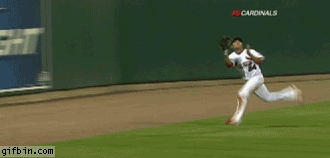 A little too far out there in left field.
A little too far out there in left field.
o-fer, oh-fer
If a baseball batter gets zero hits in any number of at-bats in a game, he’s said to go “oh for” that number (as in 0-3, said as “oh for three”), or perhaps even more colloquially, to “have an o-fer“. In business, an example of an “o-fer” would be to try repeatedly and fail to make any sales.
“I went oh-fer-three asking for girls’ Wechat numbers today.”
off base
Unaware or by surprise, usually in the phrase “caught off base.” Meaning misguided, mistaken, or working on faulty assumptions, this usage dates to 1940. Both of these uses derive from the situation of a runner being away from a base and thus in a position to being put out.
“The absence of any sharp new angle, any strong new drive in Mr. Roosevelt’s messages reflected the fact that he and his Cabinet (only Messrs. Hull. Murphy, Woodring, Edison and Ickes were at hand) had been caught off-base with the rest of the world by the Hitler-Stalin deal, the sudden push for Poland”. — Time, 3 September 1939.
on deck
Next in line to face a particular challenge. In baseball, a batter emerges from the dugout and loosens up “on deck” just before his turn to face the pitcher. OED mentions usage of “on deck” first in 1867 in the context of baseball (“on deck fig. [orig. U.S.]: at hand; ready for action; alive; in Baseball, next at the bat, with the right or privilege of batting next”.)
“Tommy McTomface is on deck to speak at our next convention.”
pinch hit
To act as a substitute or stand-in for someone when in a “pinch”, especially in an emergency. In baseball, sometimes a substitute batter would be brought in, especially at a crucial point in the game. OED gives the first possible non-baseball use in 1931, and the first definitive non-sport use in 1957.
“I can’t make it to work today, can you pinch hit for me?”
pitch a shutout
To not allow an opponent any wins. In baseball, a shutout occurs when a pitcher does not allow the opponent any runs.
“The Republican Party pitched a shutout in the South in 2000 and 2004.”
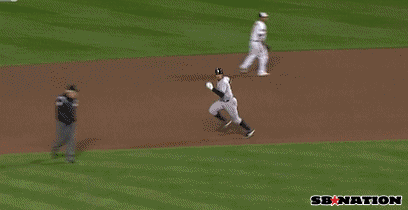 Almost caught off base.
Almost caught off base.
play ball
To get going, or to start. Before every baseball game, and after a dead ball situation such as a foul ball or a time-out, the umpire traditionally shouts “play ball” in order to start or restart the game. An alternate meaning, “to cooperate”, is not explicitly connected to baseball.
“If you’re not even gonna play ball with us, we might as back out of the deal now.”
relief pitcher
In baseball, a relief pitcher comes in as a replacement for the starting pitcher or another relief pitcher. A relief pitcher in other realms of activity also comes in as a substitute or replacement for the initial or regular occupant of a role. Similar to pinch hitter.
“Vincent B. Orange doesn’t see himself as an opportunist. Rather, he’s more of a ‘relief pitcher’ with the chops to push the District’s business goals.”—The Washington Times, 9 June 2011.
right off the bat
Immediately; without any delay. The Oxford English Dictionary dates this term to 1914 in Maclean’s, a Canadian magazine. An older term, “hot from the bat” dates to the 1888 play Meisterschaft by Mark Twain.
“Right off the bat, I’d like to start the meeting with reviewing last month’s financials.”
screwball
Eccentric, zany, or crazy. The screwball is a rarely used pitch (because of its effect on the arm) that is intended to behave erratically — it “breaks” in the opposite direction a curveball would break.
“I’m worried the market may be getting ready to throw us a screwball”. – MarketWatch, 16 October 2010.
step up to the plate
Often shortened to step up. To rise to an occasion in life. Refers to when a player must approach home plate to take a turn at batting. OED cites baseball usage in 1875, general usage in 1919.
“During next quarter, I really need the salesmen to step up to the plate.”
 Relief pitchers, amirite!?
Relief pitchers, amirite!?
strike
As in “strike out“, “three strikes and you’re out“, “a strike against you“, “he was born with two strikes against him“… In baseball, a strike is when the batter swings at and misses a pitch, or when the pitch crosses the strike zone without the batter swinging. A batter with three strikes is out and must stop batting.
The word strike has crept into common English usage to mean a failure or a shortcoming or a loss. When a person has “gotten three strikes” and “struck out“, they have failed completely. The three strikes laws refer to more severe punishments for criminals with a third conviction. Someone seeking romance with another person may “strike out” and fail to impress on a first meeting.
Having “two strikes against you” means that you have just one remaining chance to succeed at something, or that you are given little chance to succeed, perhaps because you have been prejudged.
“I asked that girl on the subway for her Wechat number, but I completely struck out.”
swing and miss
To try but fail, like swinging a bat and missing the ball. Also “a swing and a miss” is very similar to striking out, above.
“In my life, I’ve swung and missed a lot in my hunt for a girlfriend.”
swing for the fences
To try for a substantial gain even with a small chance of success; to make a big score. In baseball, to swing for the fences is to try to hit a home run.
“Everyone interviewing for this position is totalling swinging for the fences.”
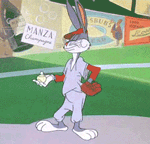 Looks legit.
Looks legit.
touch base
As in “we will touch base at the meeting”. To make contact with someone, to inform someone of one’s plans or activities, perhaps in anticipation of an event. In baseball, a player who is touching a base is not in danger of being put out. Another explanation is that a player must briefly touch each of the bases in order after hitting a home run. It may also refer to the fact that after a fly ball has been caught for an out, a runner on base who has taken a lead or is standing off his base towards the next base, must go back to touch or tag that base (“tag up“) before he can advance to the next one.
“Robert, it’s been a while. I’d like to touch base with you next week to discuss our targets.”
triple play
In baseball a triple play is the rare act of making three outs during the same continuous play. The OED attributes the original usage of “triple play” to the American game of baseball as early as 1869.
Headline: “President Obama’s Wednesday NYC Triple Play.” – Celeste Katz, New York Daily News, 26 April 2011.
whiff
In general usage, the word “whiff” may refer to the movement or sound of air or wind, perhaps as an object moves through it. In baseball a whiff is when a batter swings and misses a pitch. Such usage in baseball is attributed by the OED to 1913. Perhaps derived from this, the term “whiff” has also come to mean trying and failing at something. Similar to both “swing and miss” and “strike out.”
“I got so nervous asking for her Wechat number that I totally whiffed the whole thing.”
whole new ball game
Also brand new ball game; whole ‘nother ball game. In common usage, it signifies a drastic turn of events, a completely altered situation. In baseball, an announcer says “it’s a whole new ball game” when the trailing team ties the score or takes the lead, usually after being behind by several runs. A “whole ‘nother ball game” signifies something completely unrelated, different, or irrelevant. Also used to describe something is new and that you have a clean slate to start over.
“Tonight’s a whole new ballgame, I’m definitely getting her Wechat this time.”
There you have it! Go ahead and try using one or more of these baseball idioms in the comments below~
Or if you have any questions, let us know… we’d love to help you!
Related posts:
- 【学习】20 Podcasts to Help Improve Your American English Podcasts [‘pɑ:dkæst 播客 bō kè] are a great way to improve your English listening...
- Obscure English words to help improve your vocabulary psithurism /ˈsɪθjʊəˌɹɪzəm/ (n.) the sound of the wind through the...
- 【学习】A Comprehensive List of Basketball Terms in English and Chinese 篮球术语综合列表 (双中英文) This is a long and comprehensive list meant to be...
- 【学习】How To Say Punctuation Marks in English and Chinese 如何说标点符号 Punctuation [ˌpʌŋktʃuˈeʃən] 标点符号 (biāo diǎn fú hào) is vital to any...